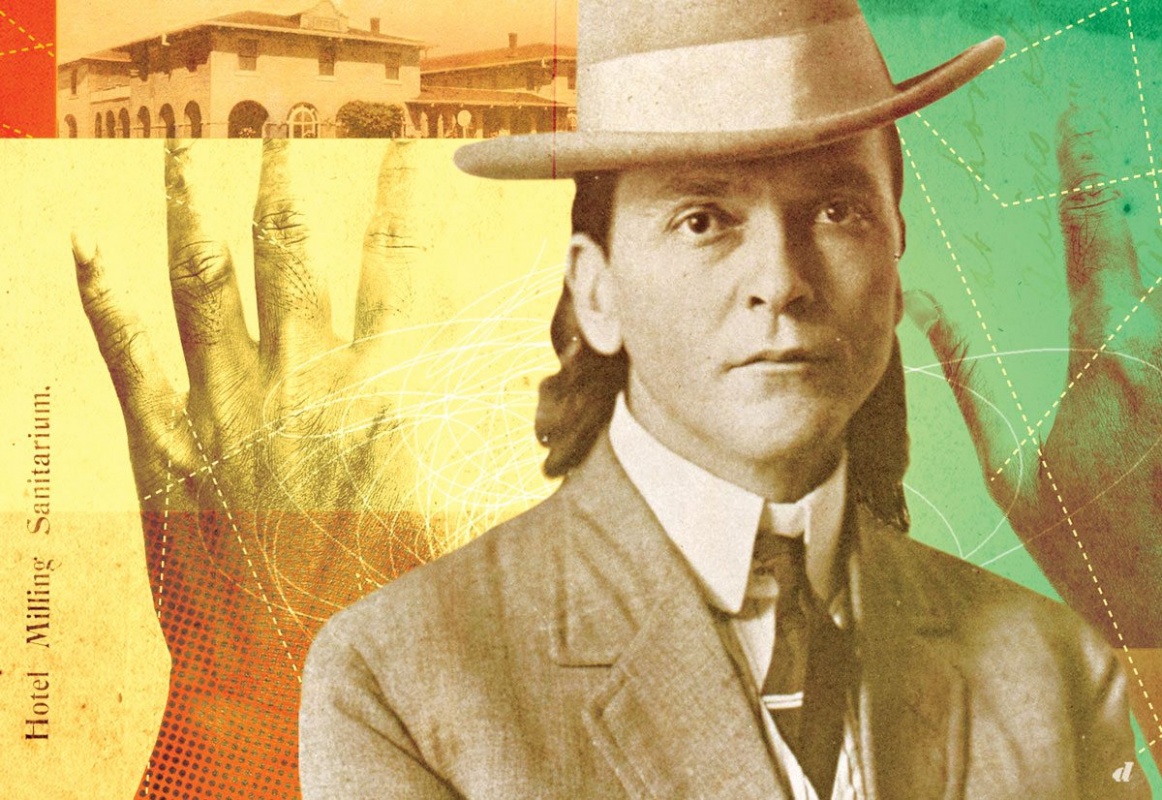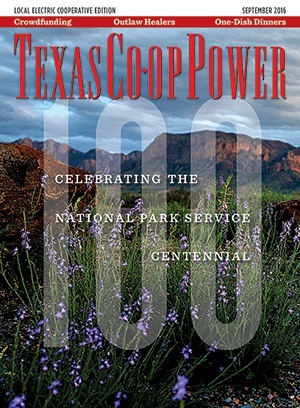Many a gang of brothers rode the Old West outlaw trail, from Frank and Jesse James to the Newton Boys. But in the late 19th and early 20th centuries, brothers R.G. and G.R. Milling became notorious not for robbing folks but for mending their mortal frames. Jailed repeatedly for practicing medicine without licenses, the Millings were the outlaw healers of North Texas.
The brothers practiced magnetic healing, a treatment that purported to address energy imbalances in one’s blood, bones, nerves, organs and skin. A flexible, drugless system, magnetic healing techniques varied among individual practitioners. Its applications ranged from noncontact, purportedly magnetic passes over the patient to rigorous manipulation. The “Milling Method” developed by elder brother R.G. involved a combination of massage, faith healing, hypnotism and showmanship.
The brothers called on their Cherokee heritage to boost their mystique. R.G. advertised himself as “the long-haired doctor” and “the Indian Adept.” He appears to have arrived in Texas from Georgia in about 1890, settling first near Stephenville then practicing in Rising Star, Cisco, Putnam, Gunsight, Mineral Wells and other towns before his death in 1925. G.R. hung his shingle as a “rubbing doctor” in Glen Rose in 1911. Just three years later, the practice likely led to his death.
Tales passed down to Milling descendants explain that R.G. first experienced the gift of healing as a boy. His mother suffered from phlebitis, and physicians in Atlanta, Georgia, could not provide relief. Desperate to comfort her, young Milling began to rub the woman, as though he could draw the sickness out of her body. She recovered quickly.
Testimonials from Texas patients swore to similar benefits, but in 1907 the tightening of Texas medical laws threatened to put R.G. out of business. “All the sick and lame of Eastland and adjoining counties,” announced one of Milling’s ads in the Cisco Round-up, “who have dosed themselves with nostrums without relief and who in vain have sacrificed their hopes upon the altar of homeopathy, should see at once Dr. Milling, the famous drugless healer, before it is everlastingly too late.”
In 1911, one Milling patient took the stand in the Stephens County Courthouse in Breckenridge to testify that Milling had practiced medicine upon him. Though he admitted under oath that the treatment relieved his rheumatism, he was upset by the $2 price for room and board at R.G.’s country sanitarium.
Milling testified that the “scientific massage” was free and the $2 charge included a stable fee for patients’ horses. Nonetheless, the jury convicted the healer, fined him $50—about $1,200 in 2016 currency—and sentenced him to 20 minutes in jail.
The setback might have spurred Milling to become even more vocal. Handbills for the Hotel Milling Sanitarium, in Putnam on the Texas and Pacific Railway line, touted him as “The Renowned Healer!”
In a 1990 interview, John Boyd Harlin of Gordon, whose brother was treated for infantile paralysis by Doc Milling in about 1915, remembered that “the doctors said he would never walk again, and my dad was just grabbin’ at straws when we went to Putnam. But Dr. Milling had him up and walking in three days.”
Throughout his career, R.G. Milling railed against “the operating table with the horrid nightmare of the ether or chloroform,” but when his kidney ailment stumped his own powers in 1925, he submitted to the knife at Dallas’ Baylor Hospital, where he succumbed to complications.
G.R. Milling’s outlawry in Glen Rose was more extreme, as he was nabbed five times for carrying a pistol in town.
In September 1914, the angry husband of a Milling patient confronted G.R. on the town square, then killed him with a double-barreled shotgun. Perhaps indicative of the outlaw healer’s stormy relationship with fellow townsmen, the Stephenville Empire reported that the killer’s $3,500 bond was “furnished in a few minutes by several Glen Rose parties.”
Correction: This story was updated September 2, 2016, to indicate that the Milling brothers’ mother visited doctors in Atlanta, Georgia, not Atlanta, Texas.
——————-
Gene Fowler is an Austin writer who specializes in history.


